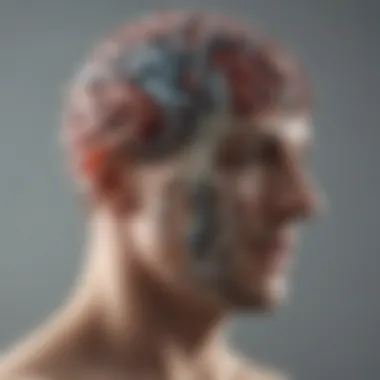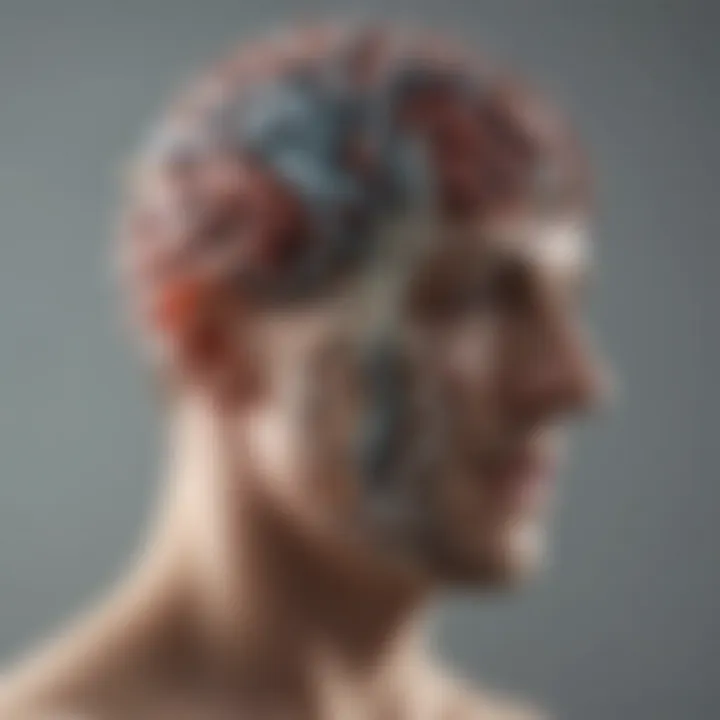Understanding Schizophrenia's Effects on Brain Function


Intro
Schizophrenia stands as one of the most complex and misunderstood mental disorders, casting a long shadow on those who grapple with it. It emerges not only as a challenge to the individual's mind but also becomes intertwined with a series of neurobiological shifts that can alter the very fabric of cognition and perception. Understanding its impact on brain functionality is vital for grasping the broader implications it carries for mental health.
When someone is diagnosed with schizophrenia, they find themselves in a unique neurological landscape. The changes unfold in various ways, including cognitive impairments, an altered sense of reality, and emotional disturbances. These transformations can create hurdles in daily living, affecting not just the individual but also those around them. By exploring this intricate relationship, we can paint a more comprehensive picture of how schizophrenia reshapes brain pathways and functions, shedding light on the clinical implications and the pressing need for compassion in treatment.
To comprehend the impact of schizophrenia, it’s essential to first take a step back and delve into the nuances of mental health and well-being. Understanding how mental health converges with brain functionality will lay the groundwork for a more informed discussion of schizophrenia's effects.
Understanding Schizophrenia
The discussion surrounding schizophrenia is both profound and layered, impacting not only the individuals diagnosed with the disorder but also their families and communities. Understanding the complexities of schizophrenia requires a careful consideration of its definition, prevalence, and types, providing crucial insights into how it reshapes brain functionality.
Defining the Disorder
Schizophrenia is a chronic mental health condition distinguished by a spectrum of cognitive, behavioral, and emotional functioning impairments. It’s more than just the occasional bad day or an odd thought process; it manifests through persistent symptoms that affect the way one thinks, feels, and behaves. Common symptoms include hallucinations, delusions, disorganized thinking, and mood disturbances. These experiences can give the impression that the person is living in a profoundly different reality than those around them.
To comprehend schizophrenia, one must recognize that it's a serious condition, often seen as a puzzle with many missing pieces. The precise cause remains elusive, but a combination of genetic, neurobiological, and environmental factors seems to play a role.
Prevalence and Demographics
Understanding the demographics related to schizophrenia can shed light on its pervasive nature. Studies suggest that around 1% of the population is affected by this disorder, but rates can vary across different groups. Men tend to show symptoms earlier, often in their late teens to early twenties, while women typically experience a later onset, often during their twenties to early thirties.
The impact of schizophrenia extends beyond mere numbers; it has social, economic, and health implications. Individuals with schizophrenia often face barriers to employment, social integration, and healthcare access, which can exacerbate their condition.
Types of Schizophrenia
While classifications have evolved over time, understanding the different types of schizophrenia is essential in grasping the complexities of the disorder. The following are some recognized types:
- Paranoid Schizophrenia: Characterized by profound delusions and auditory hallucinations, often involving themes of persecution.
- Disorganized Schizophrenia: This type showcases erratic behaviors, disorganized speech, and a lack of coherent thought patterns.
- Catatonic Schizophrenia: Individuals might display abnormal motor behavior, including extremes of excitement or stupor.
- Residual Schizophrenia: This involves a history of schizophrenia symptoms but shows less prominence currently.
Understanding these types not only enhances awareness but also aids in developing tailored treatment strategies.
"The vivid experiences of those with schizophrenia invite us to challenge our perception of reality, pushing us to redefine our understanding of mental health."
In sum, delving into the fundamentals of schizophrenia lays the groundwork for recognizing its extensive implications on brain functionality. By comprehensively defining the disorder, examining its prevalence, and categorizing its types, we begin to appreciate the intricate tapestry of human cognition and experience affected by this condition.
Neurobiological Changes in Schizophrenia
Neurobiological changes are at the core of understanding schizophrenia. These variations in brain functionality not only influence how individuals process information but also affect their emotional responses and behavior. Identifying these changes helps researchers and clinicians develop targeted interventions that may mitigate the disorder's adverse effects.
Brain Structures Affected
Prefrontal Cortex
The prefrontal cortex plays a pivotal role in complex cognitive tasks, including decision-making, problem-solving, and impulse control. Understanding its involvement in schizophrenia is crucial because individuals with this disorder often exhibit deficits in these areas. Research indicates that reduced activity in this region is associated with impaired executive functions.
Moreover, its significance lies in its interconnectivity with other brain areas, impacting emotional regulation and social interactions. Recognizing the key characteristic of the prefrontal cortex as a critical hub for higher-order functions underscores why it warrants detailed exploration in this context. Its altered functioning can lead to challenges in daily life, affecting academic performance and job stability.
Hippocampus
The hippocampus is renowned for its crucial role in memory formation. In individuals with schizophrenia, structural alterations and functional changes in the hippocampus have profound implications for their cognitive performance. The key characteristic that distinguishes the hippocampus is its involvement in the organization and retrieval of memories, which are often impaired in schizophrenia. These memory deficits can contribute to difficulties in learning and retaining information, thereby affecting everyday functioning. Notably, its unique feature of neurogenesis, the ability to form new neurons, provides some hope for potential interventions aiming at enhancing cognitive ability.
Amygdala
The amygdala is primarily known for its role in processing emotions, especially fear and pleasure. Its influence on emotional regulation presents a significant aspect of schizophrenia because abnormal functioning can lead to heightened emotional responses and difficulties in social situations. The key characteristic of the amygdala is its sensitivity to emotional stimuli, thereby playing a central role in social behavior and interactions. This highlights its importance in understanding the broader implications of schizophrenia on social skills and relationships. The amygdala’s unique feature of being part of the limbic system makes it integral to mood regulation, and its dysfunction can exacerbate symptoms of anxiety, which are prevalent among those diagnosed with schizophrenia.


Neurotransmitter Dysregulation
The dysregulation of neurotransmitter systems is one of the most significant biological components contributing to schizophrenia. This section highlights three key systems that play roles in the disorder: dopaminergic, glutamatergic, and serotonergic systems.
Dopaminergic Systems
Dopamine systems are often the focus in discussions about schizophrenia, primarily due to their link with psychotic symptoms. An overactivity of dopaminergic pathways, particularly in the mesolimbic system, is thought to contribute to hallucinations and delusions.
The key characteristic of dopaminergic systems lies in the neurotransmitter dopamine being integral to reward processing, motivation, and pleasure. This makes it an essential consideration for understanding why individuals with schizophrenia often experience anomalies in motivation and social engagement. However, the role of dopamine is complex; while hyperactivity in certain pathways corresponds to positive symptoms, hypoactivity in others can lead to negative symptoms, showcasing both the advantages and disadvantages of dopaminergic involvement in the disorder.
Glutamate Activity
Glutamate, as the primary excitatory neurotransmitter in the brain, plays a vital role in synaptic plasticity — the ability of synapses to strengthen or weaken over time. Research suggests that reduced glutamatergic activity may contribute to cognitive deficits observed in schizophrenia. Its key characteristic in this context is its potential impact on learning and memory due to its regulatory role in neural communication. This connection to cognitive function makes glutamate activity worthwhile for study when understanding the cognitive impacts of schizophrenia. However, the unique feature of glutamate's involvement in excitatory processes can also lead to repercussions on excitotoxicity if dysregulated, underlining the complexity of its role in this disorder.
Serotonergic Influences
The serotonergic system provides substantial insights into the emotional aspects of schizophrenia. Serotonin is known to influence mood, anxiety, and overall emotional well-being. Abnormalities in serotonin levels can exacerbate symptoms like depression and anxiety, common among those diagnosed with schizophrenia.
The key characteristic of serotonergic influences is their extensive interaction with different neurotransmitter systems, creating a multifaceted landscape of mental health. This makes serotonin particularly relevant for understanding the emotional consequences of the disorder. Its unique feature is its role as a modulator of mood and anxiety, giving it a potential advantage as a target for therapies aiming to enhance overall emotional stability in individuals with schizophrenia.
As we delve further into the neurobiological changes attributed to schizophrenia, recognizing these systems and structures will underscore the profound implications of the disorder on cognition and emotional function.
Cognitive Impacts of Schizophrenia
Cognitive impairments can often be an overlooked piece in the broader picture of schizophrenia. While many discussions underscore the emotional and social aspects of the disorder, it’s vital to shine a light on how it interferes with essential mental functions. The mind is the tool we use to navigate our environment, solve problems, and connect with others. Hence, when schizophrenia disrupts this functionality, it impacts not only the individual but also their interpersonal relationships and daily activities. Examining these cognitive impacts reveals how deeply rooted the disorder is in altering how one thinks, remembers, and reacts.
Attention and Concentration Deficits
Individuals grappling with schizophrenia frequently experience significant difficulties in maintaining attention and concentration. This isn’t merely a matter of being easily distracted; it’s akin to trying to read a book in a loud, chaotic atmosphere. The brain struggles to filter out the background noise, leading to missed information and impaired focus. Such deficits can severely hinder day-to-day activities, affecting everything from work performance to social interactions. A person may find themselves lose track of conversations or unable to concentrate on tasks, which fosters misunderstandings and can exacerbate feelings of isolation and frustration.
Memory Impairments
Memory functioning falls under several domains, and schizophrenia casts a long shadow over each one.
Short-term Memory
Short-term memory, the ability to hold onto information for brief periods, often suffers for those with the disorder. This characteristic is critical because it forms the foundation for learning and retaining new skills or information. When someone struggles with basic tasks that require recalling short snippets of information, it can lead to repeated questions or confusion in conversations. This situation may seem trivial, but it quickly becomes a hurdle in real-world engagements, promoting a cycle of frustration for the individual.
Working Memory
Consider working memory as the mental workspace. It helps in processing information actively, managing tasks that require attention over a short period. For someone with schizophrenia, the impairment here can have ripple effects throughout their daily life. For instance, following multi-step instructions can become a daunting challenge. The peculiar feature here is that while some individuals retain their long-term memories, the everyday cognitive functions tied to working memory become severely limited. This chasm creates barriers to performing daily tasks efficiently, leading to a diminished quality of life.
Long-term Memory
Long-term memory is often thought of as a stable reservoir of knowledge and experiences accumulated over time. For individuals with schizophrenia, this part of memory can remain relatively intact, which can lead to a curious contradiction: they might recall events from years ago yet struggle with recent experiences. This unique feature offers both advantages and drawbacks. It can allow for a richer life narrative and meaningful connections through shared memories, yet makes integrating new information challenging. Grasping new concepts or adapting to new environments can become overwhelming, leaving individuals feeling stuck in the past without the tools to engage with the present.
Executive Function Challenges
Executive functions encompass a range of cognitive processes that allow us to plan, make decisions, solve problems, and control impulses. For many with schizophrenia, there is a stark difficulty in this arena. Imagine trying to plan a dinner party, but your brain keeps sidetracking on minor details while overlooking fundamental tasks like setting the date or inviting friends. This inability to manage daily tasks effectively can lead to feelings of inferiority, anxiety, and reduced self-esteem. Moreover, the connection between disorganized thoughts and executive function is pronounced; a lack of clarity can obstruct the straightforward pathway from intention to action.
"Cognitive impairments aren't mere numbers or statistics; they are lived experiences that cast shadows on the lives of many."
In summary, the cognitive impacts of schizophrenia weave a complex narrative that affects attention, memory, and executive function. Understanding this intricate relationship not only provides insight into the disorder itself but also highlights the critical importance of addressing these issues in treatment and support strategies.
Emotional and Behavioral Consequences
Understanding the emotional and behavioral consequences of schizophrenia is vital when exploring how this disorder affects individuals' lives. Emotional responses are often tinted by the cognitive changes spurred by the condition, leading to a complex interplay that influences social interactions and personal well-being. By examining these consequences, we can better appreciate the challenges faced by those with schizophrenia and the potential pathways for support and treatment.
Anhedonia and Social Withdrawal


Anhedonia, the inability to experience pleasure, is a hallmark symptom often encountered by those grappling with schizophrenia. Imagine waking up to a world that was once vibrant, now dull and uninspiring. This emotional flatness makes engaging in previously enjoyed activities feel like a huge chore. For many, hobbies like reading or listening to music, which once brought joy, turn into mere tasks with no emotional reward.
Social withdrawal often follows closely behind anhedonia. People with schizophrenia might find themselves distancing from friends and family. Over time, they may even miss out on key life moments, whether it’s birthdays, family gatherings, or just regular catch-ups over coffee. This isolation does not just stem from a lack of interest in connecting but can also be compounded by feelings of anxiety or paranoia that can accompany the disorder. They feel as though they can’t keep up with conversations, fearing that they might expose themselves to ridicule.
"Anhedonia can blur the line between cultural expectations of social interaction and the genuine struggle of those affected by schizophrenia."
To navigate these emotional challenges, understanding and patience from both the individual and their support network are crucial. Therapeutic strategies, including cognitive-behavioral approaches, can help regain a sense of joy and connection. Small steps, like re-engaging with loved ones through light social media interactions or group activities, can pave the road back to social inclusion.
Disorganized Thinking and Behavior
Disorganized thinking is frequently apparent in individuals with schizophrenia. It often manifests as trouble organizing thoughts, making it difficult to stick to a conversation or express emotions coherently. When words jumble together like pieces of a misassembled puzzle, it leaves both the speaker and listener frustrated and puzzled alike. This symptom can lead to behaviors that may seem erratic or unpredictable, increasing the challenges faced in daily life.
For instance, someone might bounce from one topic to another during a conversation, leaving others bemused as they try to piece together the narrative. This can be especially taxing in professional environments or even in casual settings, as social exchanges require a level of coherence and focus to flourish.
On the behavioral side, this disorganization can lead to haphazard daily routines. Forgetting to complete basic tasks, like preparing a meal or picking up groceries, becomes commonplace. Even organizing one’s living space can feel overwhelming. Ultimately, these patterns can contribute further to social withdrawal and feelings of inadequacy, exacerbating the emotional turmoil already present.
To combat disorganized thinking and behavior, interventions focusing on structure and routine can be beneficial. By creating a predictable environment and encouraging the completion of small tasks, individuals can reclaim a sense of control over their lives. Likewise, therapies are designed to improve cognitive clarity can assist greatly in fostering clearer communication and expression.
In summary, recognizing the emotional and behavioral consequences of schizophrenia exposes not only the struggles but also the avenues for hope and recovery. By understanding these aspects, we pave the way for creating more supportive environments conducive to healing and well-being.
The Connection Between Genetics and Brain Changes
Understanding the connection between genetics and brain changes is crucial in the realm of schizophrenia research. Genetics plays a significant role in the development of schizophrenia, influencing not just the presence of the disorder but also its manifestation and severity. This section explores how genetics intertwines with the neurobiological alterations seen in individuals with schizophrenia, shedding light on how inherited factors contribute to brain functionality during episodes and between them.
Heritability of Schizophrenia
The heritability of schizophrenia is a core aspect that researchers grapple with in the field. Studies suggest that the likelihood of developing the disorder increases with familial relationships. If a parent has schizophrenia, the chances a child will develop it rise dramatically compared to the general population. The statistics can be quite striking:
- General Population Risk: Around 1%
- First-Degree Relatives (Parents/Siblings): About 10%
- Monozygotic Twins: Approximately 40% to 50%
This hereditary component illustrates that genes contribute significantly to the odds of developing schizophrenia. However, it’s more complex than just a straightforward genetic inheritance. The interplay between genetic predisposition and environmental factors, such as stress and exposure to toxins, adds layers to how these genetic influences manifest in an individual's brain and behavior.
Genetic Markers and Brain Structure
Diving deeper into the genetics of schizophrenia reveals the intriguing landscape of specific genetic markers associated with brain changes. Research has identified various genes that may affect neurotransmitter systems and brain morphology, especially focusing on regions like the prefrontal cortex and amygdala. The following aspects are worth noting:
- Neurodevelopmental Genes: Certain genes, for instance, those affecting the development of synapses, may lead to alterations in neural circuits resulting in cognitive impairments.
- Candidate Genes: Genes like COMT, which modulates dopaminergic activity, have been spotlighted for their potential role in influencing the severity of symptoms in schizophrenia.
- Whole Genome Associations: Large-scale studies have pinpointed several single nucleotide polymorphisms (SNPs) linked to structural brain differences, shedding light on why some individuals experience more profound cognitive dysfunction or aberrant thought patterns than others.
"Genetics provides the blueprint, but the environment paints the picture of how schizophrenia unfolds in the mind."
Understanding these genetic underpinnings is vital, not just for grasping the disorder's complexity, but also for paving the way for targeted treatments and interventions. By exploring the genetic markers linked to brain structure, we gain insights into restoring the function and enhancing the quality of life for those affected by schizophrenia.
Environmental Factors and Brain Function
Environmental elements play a notable role in shaping brain functionality, especially in individuals with schizophrenia. While genetic predispositions and neurobiological changes are pivotal in understanding this disorder, the external factors that continuously interact with these internal mechanisms cannot be ignored. Stressors such as trauma, substance use, and social dynamics, along with prenatal environments, contribute significantly to how schizophrenia manifests in the brain. Recognizing the interplay between these elements and brain function is critical for advancing treatment strategies.
Impact of Stressors
Stressors are among the most prevalent environmental influences affecting the brain’s functionality in those with schizophrenia. Life events like losing a job, relationship breakdowns or even financial strain can exacerbate symptoms. Stress doesn’t just affect how one feels; it induces biochemical changes in the brain.
When faced with stress, the body releases cortisol, a hormone that disrupts neurotransmitter systems integral to mood regulation and cognitive functioning. Prolonged exposure to high levels of cortisol can lead the brain to remodel itself, particularly affecting the hippocampus, which plays a role in memory and learning.
- Cortisol Levels and Brain Communication: High cortisol levels can impede dopaminergic pathways, causing disturbances in how messages are passed between neurons. This altered communication contributes to the cognitive deficits seen in individuals with schizophrenia.
- Vulnerability to Symptoms: Increased stress may also leave individuals more susceptible to the onset of psychotic symptoms or trigger existing symptoms leading to social withdrawal and further decline in quality of life.
Understanding these stressors can provide valuable insights for developing coping strategies.


Prenatal and Early Life Influences
Factors starting from prenatal stages lay critical groundwork for the brain's health and development. Studies indicate that experiences during pregnancy, such as maternal stress, smoking, or infection, can significantly increase the risk of developing schizophrenia later in life. This risk is often compounded by elements in early life, like childhood trauma or environmental toxins.
When discussing prenatal and early life influences, consider the following:
- Maternal Health: Conditions like malnutrition or chronic illness can severely affect fetal brain development, leading to altered structures and pathways in the brain.
- Early Trauma: Childhood abuse or neglect may also cultivate a heightened response to stress, leading to long-term impairment in areas responsible for emotional regulation.
- Environmental Toxins: Exposure to pollutants or chemicals at a young age—especially during critical periods of brain development—can predispose individuals to mental health challenges later on.
"Environmental influences can set the stage for the neural pathways that either protect or jeopardize mental health across a lifetime."
Effectively addressing these environmental factors alongside pharmacological and psychosocial interventions can lead to a more comprehensive approach to treatment and rehabilitation. By understanding these pieces of the puzzle, it becomes clearer how significant the environmental landscape is in influencing brain function in patients with schizophrenia.
Implications for Treatment
Understanding how schizophrenia affects brain functionality is crucial for developing effective treatment strategies. The implications of these findings are twofold: on one hand, they highlight the necessity of tailored interventions that address the unique neurobiological changes associated with schizophrenia. On the other hand, they emphasize the need for comprehensive treatment plans that integrate various therapeutic approaches to support overall mental health.
Pharmacological Approaches
When it comes to pharmacological treatments, there are a few key players that have been deemed effective in managing schizophrenia symptoms. Antipsychotic medications are at the forefront. Drugs like clozapine and risperidone work by targeting neurotransmitter pathways, particularly dopamine, which plays a significant role in mood and perception. These medications aim to restore balance in the brain's communication systems, helping to reduce hallucinatory experiences and stabilize mood.
- Key medications include:
- Clozapine
- Risperidone
- Aripiprazole
However, it's crucial to understand that while these drugs can mitigate symptoms, they often come with side effects, such as weight gain, sedation, or metabolic syndrome. Patients must be monitored closely, and discussions regarding potential risks and benefits should always be prioritized. Furthermore, some individuals may respond differently to medications, which can necessitate a trial-and-error approach to find the most effective treatment. Therefore, engagement between healthcare providers and patients stands as a bedrock for effective prescription practices.
Psychosocial Interventions
In addition to medications, psychosocial interventions form an integral part of a holistic treatment strategy. These approaches focus on the psychological and social dimensions of living with schizophrenia, addressing both cognitive and emotional needs. Cognitive-behavioral therapy (CBT) has shown promise in helping individuals reframe negative thought patterns, promoting healthier ways to cope with their condition. Group therapy can also offer invaluable support, providing a sense of community and shared experience among those facing similar struggles.
Key psychosocial strategies include:
- Cognitive-Behavioral Therapy (CBT): Targets specific thought patterns that contribute to distress.
- Family Therapy: Involves family members in the treatment process, fostering better communication and support systems.
- Psychoeducation: Educates patients and families about the disorder, helping to demystify symptoms and combat stigma.
"A multi-faceted approach is vital. Medication alone doesn’t address all aspects of life impacted by schizophrenia."
Ultimately, the integration of pharmacological and psychosocial interventions leads to more personalized and effective care. Patients often report enhanced quality of life when both elements are considered in treatment planning. As we move toward a more personalized understanding of schizophrenia, the emphasis must remain firmly on holistic care that recognizes the intricate relationship between brain functionality and mental well-being.
Ending: Understanding the Intersection of Schizophrenia and Brain Health
The intricate web of schizophrenia and its impact on brain functionality cannot be overstated. Schizophrenia is not merely a collection of symptoms observed on the surface; it occupies a complex role in shaping the neurobiological landscape of the brain. Throughout the article, we have seen how specific areas of the brain, particularly the prefrontal cortex, hippocampus, and amygdala, undergo significant changes, affecting everything from memory to emotional regulation.
Key Takeaways
The significance of recognizing these changes is multi-faceted:
- Clinical Relevance: Understanding how schizophrenia alters brain structure can lead to better treatment approaches, allowing for interventions that can target specific cognitive deficits.
- Personal Acknowledgment: For those affected by schizophrenia, knowing that their struggles are linked to tangible neurological changes can be validating, reducing stigma associated with the disorder.
- Societal Awareness: Broader comprehension of these impacts is vital in fostering empathy and support for individuals facing these challenges.
"The brain is a compass that guides our thoughts and feelings; understanding its dysfunctions can help recalibrate our perceptions of mental health."
Navigating Future Directions
The exploration of effective treatment methods remains a priority. Pharmacological strategies aimed at rectifying neurotransmitter imbalances are crucial, but they can be significantly enhanced when blended with psychosocial interventions that attend to the cognitive and emotional dimensions of the disorder.
Implications for Mental Health Advocacy
By dissecting the relationship between schizophrenia and brain function, mental health advocates can develop campaigns that highlight not only the need for effective treatments but also the importance of early intervention and supportive environments. This connection to brain health forms a solid foundation for future research aimed at unveiling innovative therapeutic strategies and improving the lives of those affected.
Wrapping Up
In summary, the intersection of schizophrenia and brain health stands as a pivotal area of inquiry. It embodies both the challenges and opportunities of understanding mental health in a more nuanced manner. Through continued research and dialogue, we may edge closer to untangling the complexities of schizophrenia, improving not only clinical approaches but enriching the overall discourse surrounding mental health and wellness.















